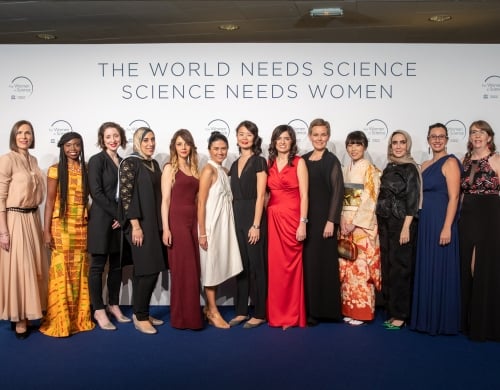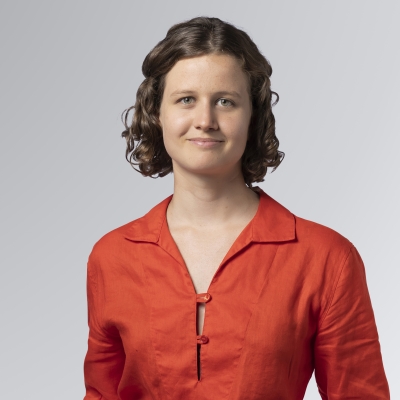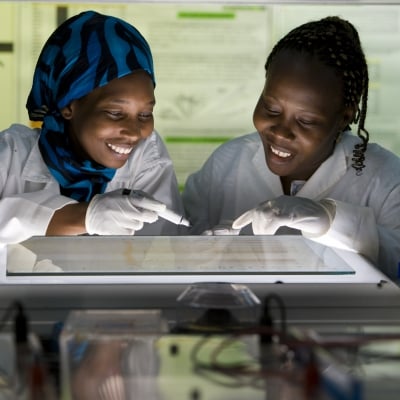International Rising Talents
The International Rising Talents program rewards the 15 most promising young women scientists across all the countries where our Young Talents program is active.

Highlighting promising scientific talents
Each year, our International Rising Talents program awards 15 outstanding young researchers, chosen from among our national and regional Young Talents programs, with an additional endowment of €15,000.
Excelling in varied and important disciplines, these young women represent the future of science. We believe that recognising their excellence and giving them an international visibility will help to raise their profile within the scientific community and ensure that they reach their full potential.
15 international outstanding young researchers.
International Rising Talents 2022
-
![]() Dr. Daria SmirnovaInstitute of Applied Physics of the Russian Academy of Sciences, Russia.
Dr. Daria SmirnovaInstitute of Applied Physics of the Russian Academy of Sciences, Russia.Awarded for her research in photonics, a field with a significant potential to revolutionize modern technologies, from optical data communications to biosensing. She is exploring innovations at the nexus of fundamental physics, material science and applied science, and dreams of generating real-life applications in superior photonic devices and quantum computing based on engineered topological phases of light.
-
![]() Dr. Alison McAfeeUniversity of British Columbia and North Carolina State University, Canada.
Dr. Alison McAfeeUniversity of British Columbia and North Carolina State University, Canada.Awarded for her pioneering research on honeybee reproduction and fertility. Her work focuses on environmental risks to honeybees, including extreme temperatures and chemical pesticides, and in particular, explores how best to protect queen bees, so they can continue laying fertilized eggs and maintaining strong colonies.
-
![]() Dr. Beatriz VillarroelStockholm University, Sweden.
Dr. Beatriz VillarroelStockholm University, Sweden.Recognized for her explorations in astrophysical phenomena, which are yielding intriguing findings that shed new light on the mysteries of the universe. She leads the Vanishing and Appearing Sources during a Century of Observations (VASCO) project, comparing historical sky catalogues with current images, searching for vanishing objects and other extraordinary events in the sky. Some of the astronomical events the project hopes to eventually find include gradually dimming quasars or a massive star that collapses directly into a black hole without emitting a bright supernova. Such stars could even be the signature of the advanced technology of an alien supercivilisation.
-
![]() Dr. Daphné LemasquerierUniversity of Texas at Austin.
Dr. Daphné LemasquerierUniversity of Texas at Austin.Awarded for her research in geophysical fluid dynamics at the intersection of planetary sciences and fluid mechanics during her PhD in France at Aix-Marseille University. Leveraging rotating fluid mechanics experiments to complement spatial observations, she has helped to better understand key phenomena observed on gas giant planets, and in particular the bands and large vortices of Jupiter. Today, as a post-doctoral fellow at the University of Texas in Austin, she now focuses Jupiter’s icy moon Europa, and models the circulation of the global ocean buried below its icy crust. Her findings also have relevance to the dynamics of our terrestrial oceans, atmospheres, or even deep liquid cores, where similar physical effects are at play.
-
![]() Dr. Irene del RealAustral University, Chile.
Dr. Irene del RealAustral University, Chile.Awarded for her research on economic geology, and in particular on the formation of copper in the earth’s crust, a vital metal for the transition to renewable energy and electromobility. Her work has particular importance for Chile, which provides more than 30% of the world’s copper, and goes further to explore the larger questions regarding the country’s tectonic evolution and pathways to more sustainable mining.
-
![]() Dr. Karolina Mikulska-RuminskaNicolaus Copernicus University, Poland.
Dr. Karolina Mikulska-RuminskaNicolaus Copernicus University, Poland.Awarded for her research on ferroptosis, an iron-dependent form of regulated cell death implicated in a broad range of diseases. Ferroptosis is correlated with cerebello-cortical atrophy, sepsis, bacterial and viral diseases, as well as with the degradation of tissue in brain trauma, kidney diseases, and asthma. Extensive studies shows that induction of ferroptosis has a great potential in cancer therapy, while its suppression may be used for inhibition of the neurodegenerative diseases (e.g., Alzheimer’s disease, Parkinson’s disease and Huntington’s disease). Her research brought new knowledge about ferroptotic machinery at the molecular level which is essential for developing new drugs and helping to prevent asthma and other diseases.
-
![]() Dr. Lina DahabiyehThe University of Jordan, Jordan.
Dr. Lina DahabiyehThe University of Jordan, Jordan.Recognized for her leading work in developing and applying cutting edge bioanalytical techniques to better understand conditions including Parkinson’s disease and pre-eclampsia. This is particularly important given the lack of knowledge surrounding Parkinson’s, the second most common progressive neurodegenerative disorder worldwide, for which there is still no cure or preventative therapy. Her research leverages approaches and strategies to discover potential biomarkers to promote more effective diagnosis and drug development and monitoring, while shedding light on underlying the condition’s mechanisms.
-
![]() Dr. Maria Florencia CayrolInstitute of Biomedical Research -UCA-CONICET, Argentina.
Dr. Maria Florencia CayrolInstitute of Biomedical Research -UCA-CONICET, Argentina.Awarded for her leading cancer research. In particular, she is exploring the action of thyroid hormones in diverse cancer models, such as different subtypes of T cell lymphomas which can be particularly aggressive, as no specific treatments are available. She is also expanding her studies in other solid tumors including melanoma, the most serious type of skin cancer, thus opening new opportunities to help develop more innovative, and better targeted treatments for cancer patients.
-
![]() Dr. Natalia BrunoNational Institute of Optics of the National Research Council, Italy.
Dr. Natalia BrunoNational Institute of Optics of the National Research Council, Italy.Awarded for her research in quantum optics. Her studies of the interaction between particles of light (entangled photons) and matter are helping to pave the way for new quantum technologies for the next generation of quantum computers, networks, and enhanced sensors with superior levels of performance. This could help to boost progress in fields where significant computational power is needed (such as health and climate research) and enable the safe exchange of sensitive information.
-
![]() Dr. Ndeye Maty NdiayeUniversity of Cheikh Anta Diop de Dakar, Senegal.
Dr. Ndeye Maty NdiayeUniversity of Cheikh Anta Diop de Dakar, Senegal.Awarded for her contribution to advancing renewable energy in Senegal and helping to bridge the country’s electricity production gap. Her research focuses on energy storage systems, such as supercapacitors, and could particularly benefit off-grid, rural communities, power devices such as mobile phones and wind turbines and enable more young women and men to pursue their studies.
-
![]() Dr. Pantana Tor-ngernChulalongkorn University, Thailand.
Dr. Pantana Tor-ngernChulalongkorn University, Thailand.Awarded for her research into the impacts of climate variability and change on water and carbon cycles in the forests of Southeast Asia. Her work focuses on canopy transpiration and photosynthesis, essential factors to forests’ ability to regulate the climate, and will prove invaluable in a region where rapidly occurring land-use changes have created a complex picture and triggered different responses to climate change.
-
![]() Dr. So Young ChoiKorea Advanced Institute of Science and Technology, South Korea.
Dr. So Young ChoiKorea Advanced Institute of Science and Technology, South Korea.Awarded for developing microorganisms to produce biodegradable plastics from non-edible biomass such as wheat straw, hay, and bagasse (a byproduct of the sugar industry) - important alternatives to oil-based plastics. Her research is based on manipulating cellular metabolisms to efficiently produce chemicals of interest and integrates multiple tools and strategies. She is conducting genetic engineering of microorganisms, especially Escherichia coli, to maximize the performance of PHA production, and exploring ways to expand its use while also producing new types.
-
![]() Dr. Van Thi Thanh HoHochiminh City University of Natural Resources and Environment, Vietnam.
Dr. Van Thi Thanh HoHochiminh City University of Natural Resources and Environment, Vietnam.Awarded for her research in hydrogen fuel cell technology, an important area of focus for the future of clean energy. In particular, she is optimizing the operation of fuel cells to improve performance and enable the production of sustainable hydrogen energy, avoiding the burning of fossil fuels and reducing carbon emissions.
-
![]() Dr. Waad SaftlyAl-Baath University, Syria.
Dr. Waad SaftlyAl-Baath University, Syria.Awarded for her research on galaxy formation and evolution through the history of the universe. She is employing state-of-the-art, large scale cosmological numerical simulations to reproduce the observed properties of galaxies, comparing the simulated galaxies to real observations. Ultimately, she aims not only to better understand the physical processes that drive galaxy evolution, but also to create new benchmarks to improve the next generation of cosmological simulations.
-
![]() Ieva PlikusienėVilnius University, Lithuania.
Ieva PlikusienėVilnius University, Lithuania.Awarded for her ground-breaking work in leveraging novel immunosensors to investigate the interaction of the structural proteins of the SARS-CoV-2 virus with specific antibodies. Her findings are vital to understand how spike and nucleocapsid proteins forms immune complexes with specific antibodies that are developed after vaccination or recovery from Covid-19, and ultimately to exploring how the virus can be neutralised.


















